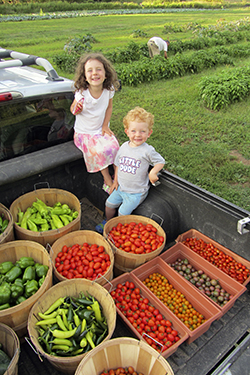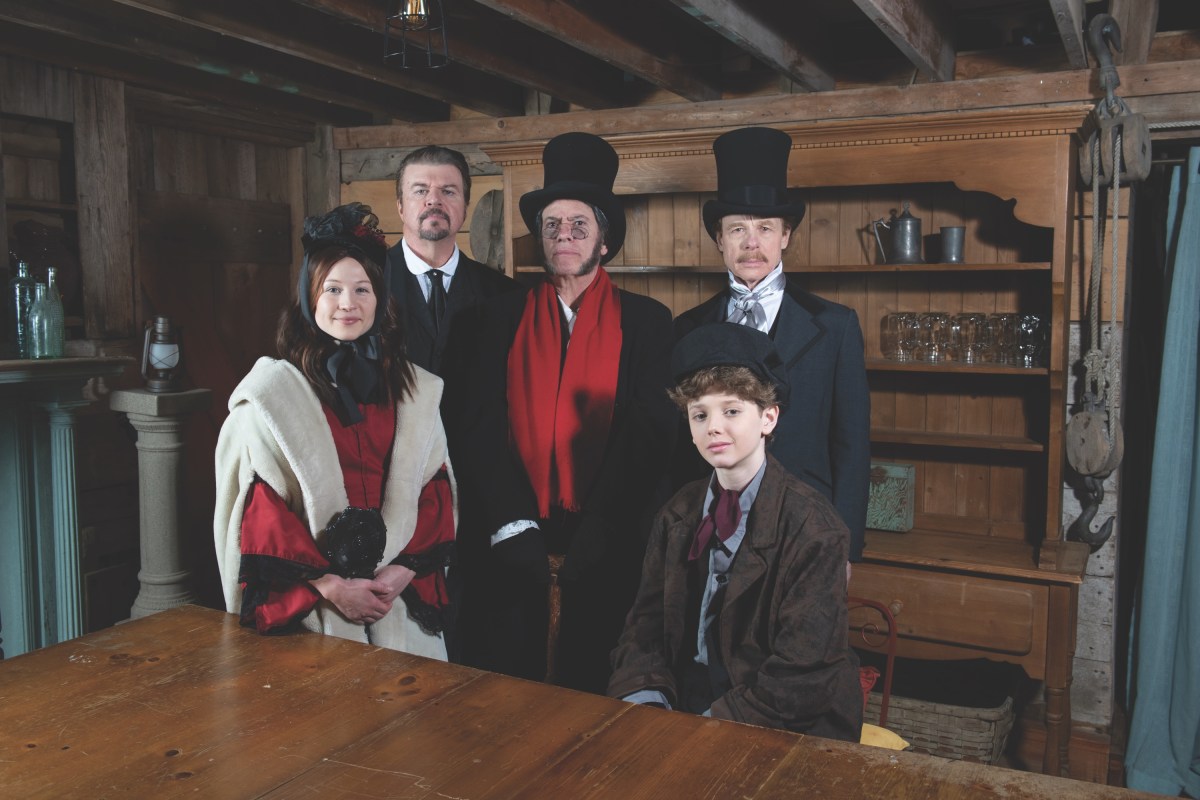Not far from the traffic-choked lanes of Route 110 and the generic strip-malls of any-town Nassau, lies an oasis of rich farmland run for the past seven years by a husband and wife team straight off the American Gothic canvas.
And now after a new deal with Nassau County to update their lease, Daniel Holmes and Caroline Fanning will continue to stake their claim to all seven acres of Restoration Farm in Old Bethpage for five more guaranteed years with the probability of more to follow.
“The county has been so supportive. They like what we’ve been doing here and can appreciate why we do it,” said Holmes, adding he and Fanning were the only bidders for the land, located on the grounds of the Old Bethpage Village Restoration. “We are able to talk openly with the county about how things are going for us and they’ve been able to understand us better during this process. They’ve left us alone for the most part.”
With that freedom to operate as they wish, the farming couple as been able to provide organically-minded Long Islanders with fresh vegetables, berries, herbs, flowers, eggs, poultry and honey from their own swarm of bees through their Community Supported Agriculture (CSA) program and weekly farm stand.

Of course, snow-suffocated grounds stifle the farm’s winter output, but participants can expect to once again receive their farm-full soon after the spring thaw. There is currently a two-year wait to join the farm’s CSA, a fact that Fanning believes grew from Long Islanders’ craving for locally grown and raised fare.
“Because there isn’t a strong agrarian culture on Long Island, people think what we are doing is really wonderful,” said Fanning. “I was initially really just into the craft of farming — improving soil and the science of producing healthy crops — but when the harvest starts and I start interacting with customers, that is when I see the real rewards of this.”
And the reward to the Plainview-Old Bethpage neighborhood and beyond comes in the form of sustainable agriculture without herbicides, pesticides or synthetic fertilizers. Instead, Restoration Farm relies on time-honored methods of crop rotation, cover cropping and composting to maintain soil fertility and to combat weeds and disease.
The result is a high-standard of quality food grown and distributed in full view of their customers.
“There are a lot of layers to how this works; but mainly we want to provide an intmacy and a more direct relationship with food,” said Holmes. “People are really wowed by how close they are to this. It’s a very unique thing on this part of the island. People are used to going out east for pumpkins and corn, but this is an oasis of land in the middle of the island. It is something you don’t see anymore.”
Both native Long Islanders, Holmes and Fanning met while working on a farm at Vassar College in Poughkeepsie, New York. Upon returning to Long Island, Holmes became the head grower at Sophia Garden in Amityville. Soon after that, Fanning joined her future husband, and in 2007 they signed their first contract with Nassau County to launch the farm.
Aside from a few full- and part-time staff members, Restoration Farm welcomes volunteers to get their hands dirty in the fields. Holmes said the farm has a strong base of a half-dozen committed volunteers, comprised mostly of retired individuals who have the convenience of free time.
“We encourage people to come out and help if they want to,” said Holmes, adding that volunteering creates an even more intimate atmosphere for the customers. “There’s an ‘a-ha moment’ moment for the consumer. They see us working in the field all day getting their food or they themselves work in the field all day, and suddenly the food isn’t coming from a faceless supermarket. That’s the intimacy.”
And the farm is attempting to spread food-intimacy to the younger generation with a new education program that bringing school field trips and camp groups to the farm to learn about the growing process.
“You pull a carrot out of the ground and to children it’s this miraculous thing,” said Holmes. “There is such a detachment from our food and where it comes from. We want to help people understand the process.”
Part of that learning process, according to Holmes, is understand where and how animals are raised and meat is processed. Holmes said the farm currently raises a few chickens for eggs and meat, but they hope to start making the move toward raising the fauna level on the grounds.
“We want to have more animals, that’s where I’m headed with this,” said Holmes, adding that he has heard some strong reactions to his animal-raising idea. “Anyone who has a strong negative reaction, I asked them if they know where meat comes from and where it is raised. The way we raise and process our chickens is eons better than anything that happens to the chickens you’re buying at the store.”
For all the benefits of providing customers with fresh meat and produce, Holmes and Fanning said their true love of farm life still residents in the dirt in their fingernails and the sweat on their brow.
“For us, summer always means working outdoors,” said Fanning. “We’re in the beginning stages of the season now. We just started onions, the first planting of the season. Soon we’ll plant the peas and before you know it we’ll have our first harvest of the season June 1. We spend so much time in the field; between the two of us, one is always out there.”
For more information about Restoration Farm, including how to join the CSA, visit www.restorationfarm.com.






























